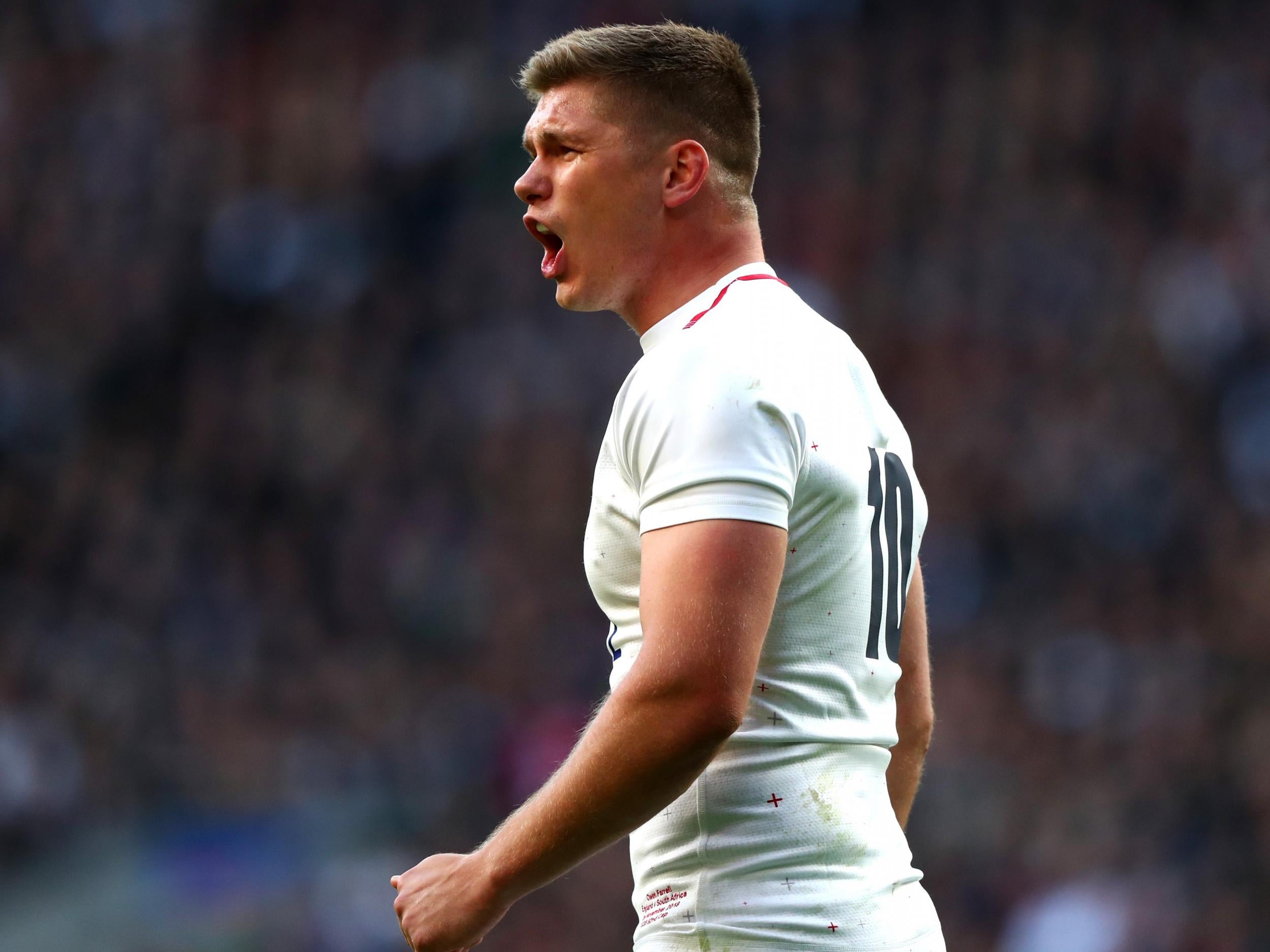Was Eddie Jones’ decision to bring on Owen Farrell an admission that England are a one-man team?
Jones came as close to an admission as you can get when asked whether England are a one-man side, but as he explained, that may not be a bad thing

Your support helps us to tell the story
From reproductive rights to climate change to Big Tech, The Independent is on the ground when the story is developing. Whether it's investigating the financials of Elon Musk's pro-Trump PAC or producing our latest documentary, 'The A Word', which shines a light on the American women fighting for reproductive rights, we know how important it is to parse out the facts from the messaging.
At such a critical moment in US history, we need reporters on the ground. Your donation allows us to keep sending journalists to speak to both sides of the story.
The Independent is trusted by Americans across the entire political spectrum. And unlike many other quality news outlets, we choose not to lock Americans out of our reporting and analysis with paywalls. We believe quality journalism should be available to everyone, paid for by those who can afford it.
Your support makes all the difference.Eddie Jones was able to smile following the scare against Japan rugby for many reason. For a start, England avoided becoming another scalp on the Brave Blossoms record, which now gives them a strong chance of ending the autumn campaign going three from four.
He watched his side recover from a dismal first half to win the second half an impressive 25-0, and he was given a timely reminder of what George Ford can do as he helped to change the game with a captain’s performance – not to mention a promising debut performance from powerhouse wing Joe Cokanasiga.
But there was still cause for concern in the back of his mind. That first half performance was among England’s worst under the Australian’s tenure, with a side showing 11 new faces from the previous week being “seduced” by the early Danny Care try into believing they would be in for an easy day at the office.
His response to this was to send on Owen Farrell. Of course, this is an obvious move given that the 26-year-old is currently playing at a level few around the world can equal. But it also raises an uncomfortable question: have England become a one-man team?
The answer, according to Jones, was not quite the “100 per cent” answer that he rolls out on a weekly basis, but it was as close to an admission as you can get. But as he explained, that may not be a bad thing.
“Well, if I was Japan and I had Michael Leitch off the field, I’d be a bit worried too,” said Jones. “If I was us with Owen Farrell off the field, I’d be a bit worried. If I was Ireland with (Johnny) Sexton off the field, I’d be a bit worried. Do you want me to keep going?
“(Farrell’s) an influential player. Of course he’s important to us.
“Obviously the standard wasn’t acceptable but it was a great learning game for us and that’s what we wanted it to be. I was so pleased that Japan came into the game with such an aggressive attitude. I wanted them to take it to us. We picked an experimental team, purposefully, to be tested and we got tested. Then we needed to respond and the response was absolutely fantastic.”

It is a symbol of Farrell’s growing importance to this England side. The move to fly-half, the promotion to co-captain, it is all an acceptance by Jones that he is the man that he needs to build his team around if they are to have any chance of beating Ireland, New Zealand and all other comers to the World Cup next year.
Jones tasked Farrell with changing England’s attitude towards the match, sending him on in place of Alex Lozowski who looked to be feeling the effects of four weeks without rugby after serving a recent suspension. Along with Henry Slade, on for the injured Chris Ashton, Farrell was able to give England more direction in possession which in turn opened up opportunities for those around him – in particular George Ford – to exploit a fading Japan defence.
“I thought there was always going to be a reaction to that first half,” said Farrell. “It felt that way, especially as we came in at half-time. I felt that we would come out and perform after half time.
“I’m happy doing my job for the team. It’s not always easy watching but I enjoyed it.
“(Our attitude was) probably slightly off, and in Test match rugby that is massive. It seemed like getting that try early on that we would kick on from there but it doesn’t always happen like that and it didn’t. It took us a while to get back into it, and we would hope that won’t happen again. It was important that we got the right reaction and we did.”
It is understandable to see Jones attempt to build on Farrell’s attributes – his ability with the ball, confrontational defence off it and leadership skills across the board – and as he notes, it happens across the world. Would England be past world champions if Sir Clive Woodward hadn’t done the same with Jonny Wilkinson? It’s very doubtful.
The only issue is what England do without Farrell, should injury or any other reason emerge that renders him unavailable. Next week’s final Quilter International against Australia will be England’s final game before the Six Nations – a championship that demands coaches select their best teams every week – which leaves England no more chances to leave Farrell out in an effort to discover a Plan B until the Rugby World Cup warm-ups in August and September next year. By then it will be far too late to do so, leaving Jones facing the very real scenario that England will head to Japan next year of being a one-man team.

Join our commenting forum
Join thought-provoking conversations, follow other Independent readers and see their replies
Comments